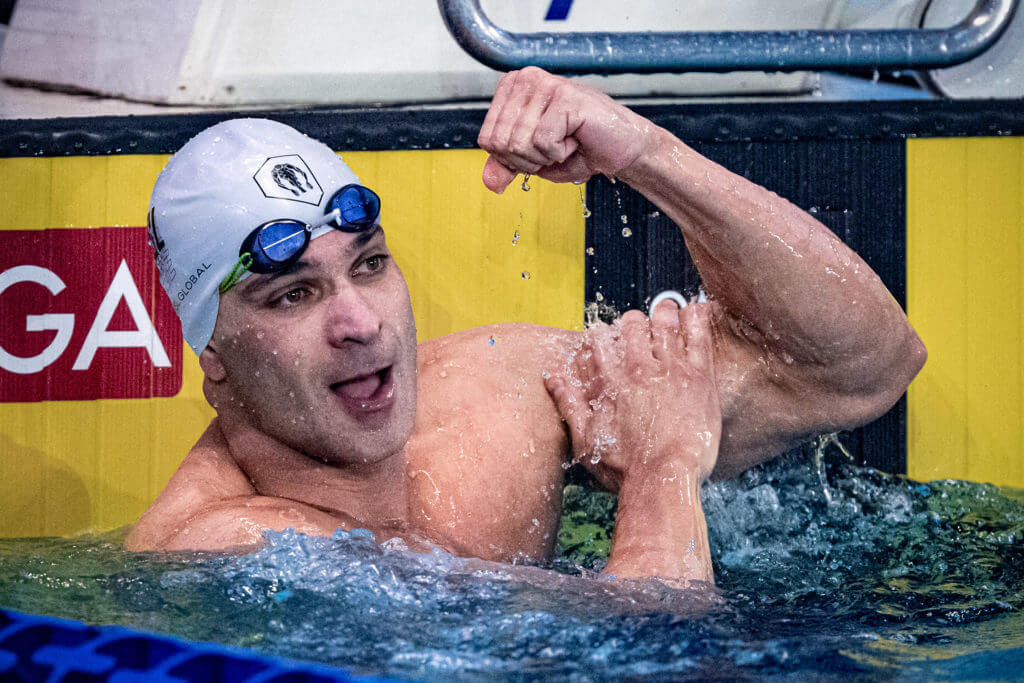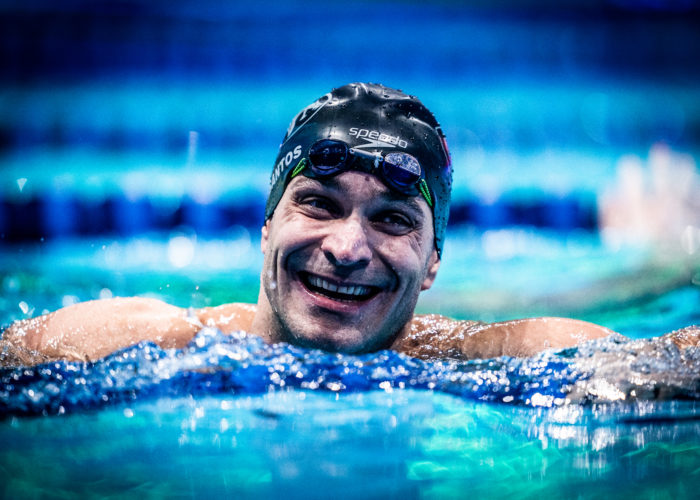Defying Age, Brazil’s Nicholas Santos Ready to Conclude Stellar Career In Style

Defying Age, Brazil’s Nicholas Santos Ready to Conclude Stellar Career In Style
Brazil’s Nicholas Santos is 42 years old. With a silver medal at the World Championships last June in the 50-meter butterfly, he broke his own record as the oldest medalist at a World Championships. Last year, he became the oldest world champion (41)—and fastest ever in the 50 fly—when he set a world record at the FINA SCM Worlds.
It was shortly after the 2012 Olympics, his second appearance at the Games, that Nicholas Santos began to realize the unique skillset that would transform his swimming career. Santos was 32 years old at the time, and at a Brazilian Championships in São Paolo, he swam a time of 22.22 in the 50 meter butterfly. The time made him the top swimmer in the world and qualified him to swim at the Short Course World Championships in Istanbul. Several months later, Santos matched that time in the Worlds final as he touched out Chad le Clos for gold by 4-hundredths.
Years of racing on the international stage had produced a solid collection of individual and relay medals from various meets, but no sustained success. With the discovery of his abilities in the shortest butterfly race on the program, Santos would redefine his legacy in the sport.
Two years later, Santos added another 50 fly medal at Short Course Worlds, a silver, and he again topped the podium in the event in 2018 and 2021. In October 2018, Santos broke the world record in the event with a mark of 21.75 (since tied).
“Beating the world record, I believe, was the highest achievement in my career, although having gone to two Olympics, getting respect from my opponents and making many friends in the sport is something to remember, too,” Santos said.
At age 35, Santos reached the podium at the long course version of the World Championships for the first time, and over the past four global long course competitions, he has been on the podium for the 50 fly each time (three silver medals and one bronze). Most recently, he won silver behind Caeleb Dressel at the 2022 championships in Budapest.
In his previous swimming life, Santos was by no means bad at the 100-meter races, but “I understood it wasn’t so good to compete in long course internationally. Short course (meters) is fine, and I can swim 49.8 or something in the 100 fly and 46 in the 100 free, but when you compare with my 50 fly, it is too far.”
Most impressively of all, Santos has achieved all of this success at a time when most of his peers have long since moved on from competitive pursuits. He is the only swimmer older than 40 to win medals at FINA World Championships, including his most recent short course gold (at age 41) and his long course silver medal this year (at age 42).
FORMULA FOR SUCCESS

Nicholas Santos; Photo Courtesy: Mine Kasapoglu/ISL
And as one might expect, the formula for success for Santos looks a lot different than the 20-somethings who are his primary competition for international medals. He trains in the pool five times per week, and his practices are typically 1,900 to 2,300 meters in distance, a fraction of the length of most of his competitors. That’s all he needs to be prepared to swim a 50 fly, and an added benefit is the ability to maintain the needed balance in his life.
“I really love to compete in my 50s because I can spend more time with my family, my son and wife, and I don’t need to stay in the pool as long as I used to (when I was training) for 100s,” Santos said. “For the 50s, if I don’t practice on Saturdays, it is fine. No doubles sessions is fine also.”
Maintaining success at his age means that Santos needs to be more cognizant of his recovery, but he believes his training in physical therapy gives him an advantage when it comes to body control. “I know what I have to do in the gym, in the pool and other situations, my mentality, supplementation, food, recovery,” Santos said. “I really like to study training methods, supplements, recovery, nutrition and biomechanics.”
HOW LONG WILL MIRACLE RUN LAST?
Of course, Santos knows that his miracle run of continued success will not last forever, and he has hinted that he plans on retiring after the Short Course World Championships this December in Melbourne, Australia. More recently, Santos said he was not sure yet.
“I’m still talking to my sponsors about retiring after the Worlds. I decided from here until the Worlds, it would not be the right moment to talk about retirement. But of course it is pretty close,” he said. “I’m 42 years old, and I’m the exception in high-performance sports today. Of course it makes more sense to retire because I think I achieved what I wanted with swimming.”
As Santos prepares to conclude his own swimming career, either at the end of this year or shortly thereafter, he plans on continuing as a manager of his team in Brazil, and he plans to watch eagerly to see who can top his world record and how fast a man can go. Hungary’s Szebasztian Szabo matched Santos’ record last year, and plenty of other young butterflyers could be gunning for the 21.75.
“I believe that naturally the records will be broken, which is natural in competitive sport. What makes me most curious is trying to understand human being’s limits. In a few years, the swimmers will be swimming 50 fly in 20 or 21-low seconds. This is the evolution of science, technology and training methods, and that’s fascinating in my opinion,” he said.
* * *
Meanwhile, Santos will not cede his throne just yet. He will make the trip to Australia as the favorite to win another world title in the 50 fly with hopes of extending his record as the oldest world champion ever in swimming. While he’s at it, maybe he will go even faster than ever before.
“I’m trying to beat my own 50 fly. Of course, the opponents are getting closer and closer, but the point here is to challenge my body’s limits, and I’m still testing it.”
Non-Subscribers can click here to download this issue for only $5.94



